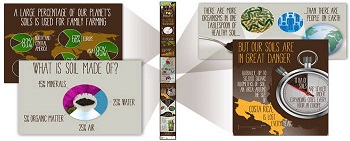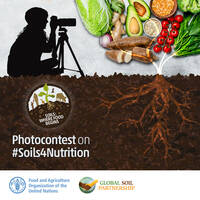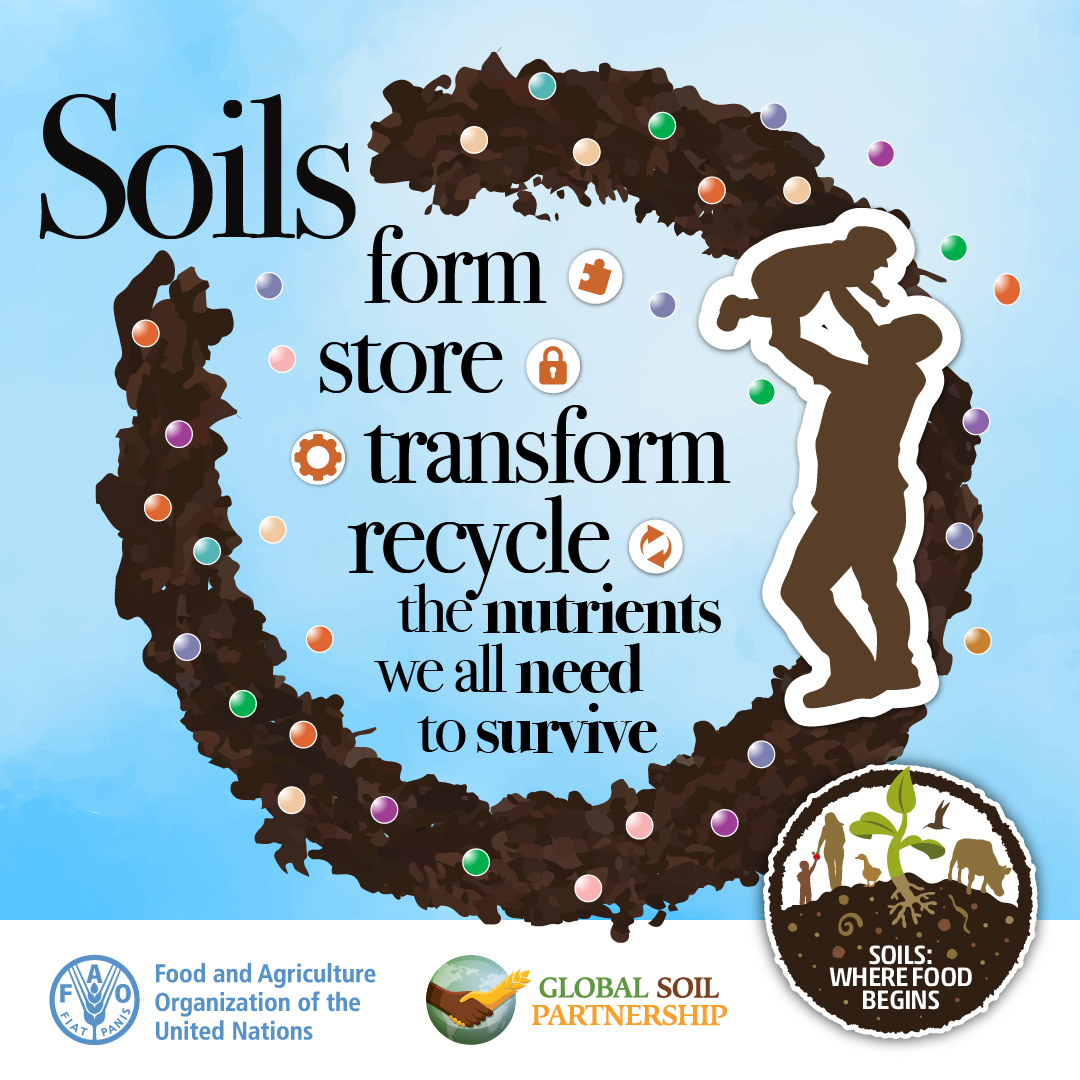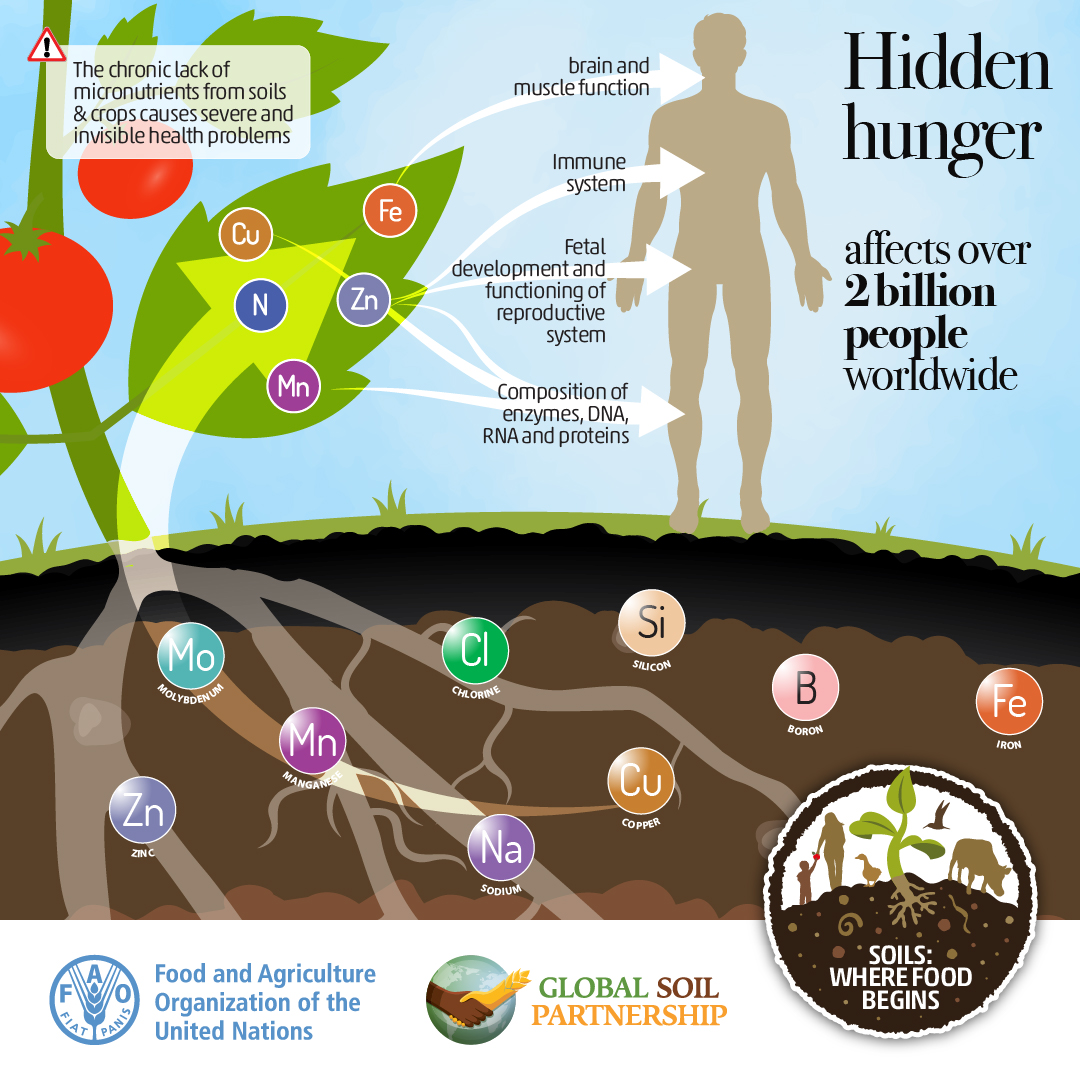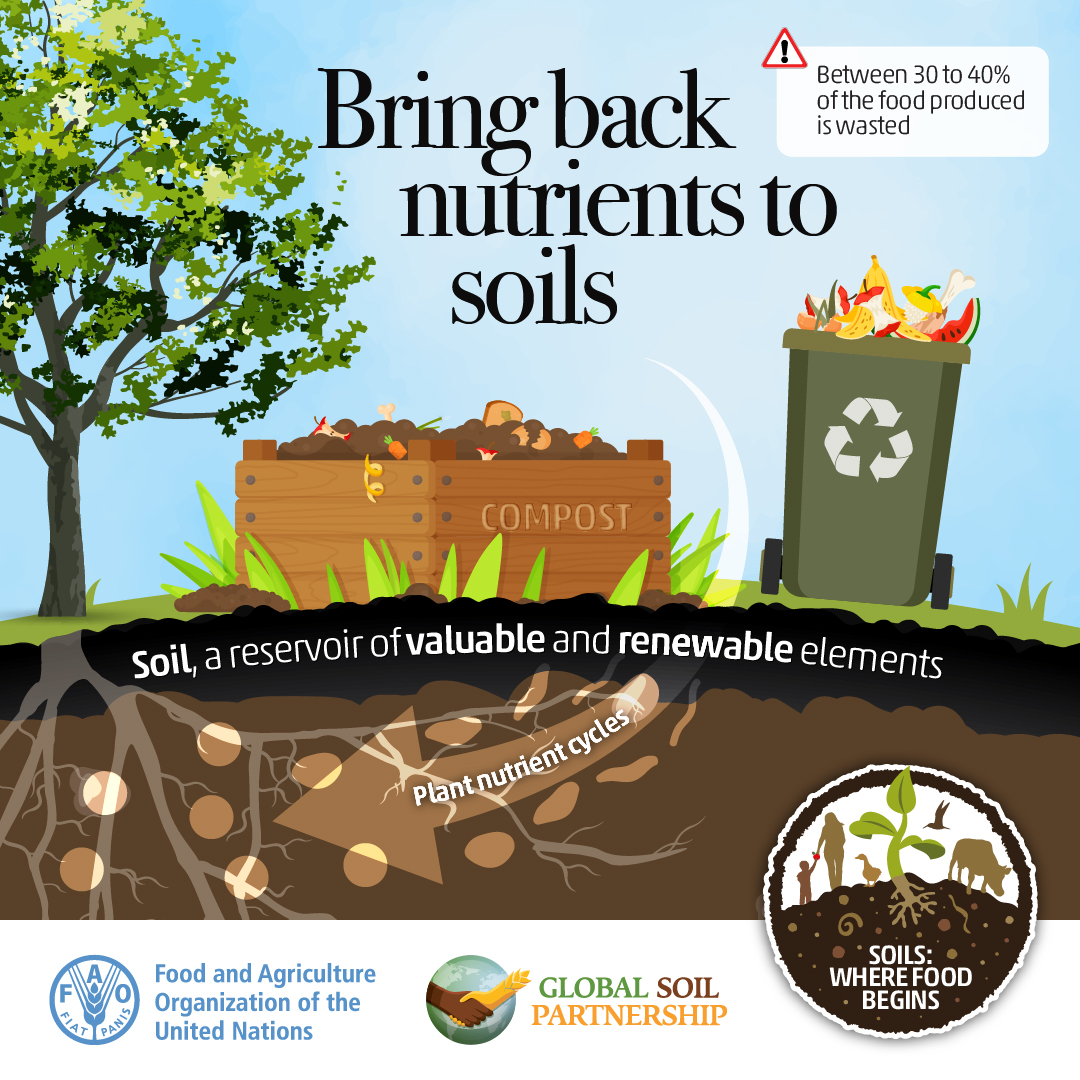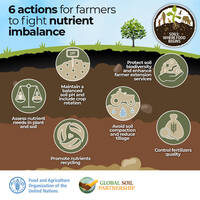
Fertile soils contribute to food security, good yields for farmers and economic development for the countries

Fertile soils are able to produce healthy food with all the necessary nutrients for a healthy person

Soil fertility is the ability of a soil to sustain plant growth, by providing essential plant nutrients and favorable chemical, physical, and biological characteristics as a habitat for plant growth

Inappropriate soil fertility management can lead to adverse risks in terms of greenhouse gas emissions and contamination of soils and waterways
Soil fertility
Soil fertility is the ability of a soil to sustain plant growth by providing essential plant nutrients and favorable chemical, physical, and biological characteristics as a habitat for plant growth. Plant nutrients include the macronutrients nitrogen, phosphorus and potassium, sulfur, calcium and magnesium. Micronutrients are essentially boron, chlorine, copper, iron, manganese, molybdenum and zinc. Fertilizers are chemical or natural substance or material that is used to provide nutrients to plants, usually via application to the soil, but also to foliage or through water in rice systems, fertigation or hydroponics or aquaculture operations. Nutrient sources include chemical and mineral fertilizers, organic fertilizers, such as livestock manures and composts, and sources of recycled nutrients.
The impacts of soil fertility are reflected in most of the Sustainable Development Goals, as they contain economic, social and environmental aspects. The main function provided by a fertile soil is the provision of food, which is very important considering FAO’s Zero hunger objective. A fertile soil also provides essential nutrients for plant growth, to produce healthy food with all the necessary nutrients needed for human health. Moreover, fertility has an impact on activities with an economic impact and is therefore related to economic growth and the fight against poverty. Finally, good management of soil fertility can help reduce soil, water and air pollution, regulate water resources availability, support a diverse and active biotic community, increase vegetation cover and allows for carbon neutral footprint.
Soil fertility is crucial for agricultural productivity and therefore for food security. It can be maintained or increased through several management practices. Farmers can improve soil fertility and soil health by optimizing soil nutrient management in terms of maximizing net returns, minimizing the soil nutrients depletion, and minimizing nutrient losses or negative impacts on the environment. Governments should promote sustainable agricultural practices, technologies and management in order to improve soil fertility and nutrient management as a whole, such as Integrated Soil Fertility Management (ISFM) and Sustainable Soil Management (SSM). The International Code of Conduct for the Sustainable Use and Management of Fertilizers promotes practices including nutrient recycling, and agronomic and land management to improve soil health; it recommends regulation related to the sale, distribution and labelling of fertilizer products, wherever appropriate. It also promotes capacity development and education programmes for all stakeholders involved in the fertilizer value chain, and encourages developed countries to assist others in developing infrastructures and capacity to manage fertilizers throughout their life cycle.
Latest stories

Soils4Nutrition project implementation
02/09/2020
Nutrition-sensitive agriculture is a food-based approach to agricultural development that puts nutritionally rich foods, dietary diversity, and food fortification at the heart of overcoming malnutrition and micronutrient deficiencies.
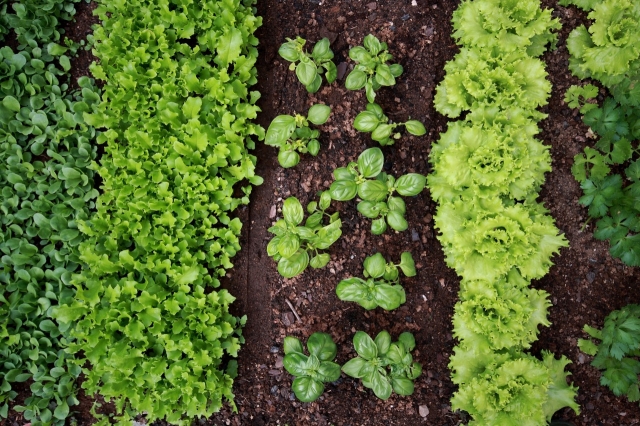
Innovation in understanding soils
22/04/2020
Soil: it grows the food that nourishes us, provides us with space we live on and even helps protect and control our climate. But unfortunately, soils are under pressure.
Available tools

Technical guidelines on soils for nutrition
Sustainable soil management for nutrition-sensitive
These technical guidelines outline the role that soil health plays in the nutritional quality of food and provide soil management recommendations to increase the supply of micronutrients to the food chain.

Fertilizers' Code implementation
Fertilizers' use and management
The Code promotes nutrient recycling, agronomic and land management to improve soil health; recommends regulation related to the sale, distribution and labelling of fertilizers.

Global Soil Doctors programme
A Farmer-to-farmer training initiative
The programme provides champion farmers with trainings, educational material and soil testing kits to build capacity on soil science and promote sustainable soil management.

Farmers' Compost Handbook
A practical guide to composting
Composting reduces pollution, reuses organic waste, reduces the cost of fertilizers and agricultural production inputs and especially returns to soil the nutrients taken to produce food.
Programmes and projects

Capacity Development on Sustainable Soil Fertility Management
The Government of China supports sustainable soil fertility management
The objective is to strengthen national capacities on soil fertility management, including appropriate fertilization and laboratory analysis of soils and fertilizers, to improve food security through increased agricultural productivity.
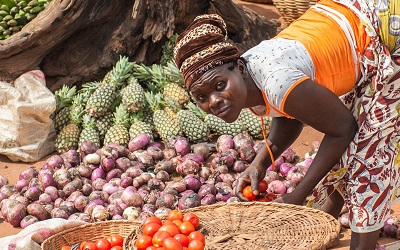
Soil4Nutrition agriculture
The Government of Germany supports the “Soils for Nutrition” project
The scope of the project is the implementation of sustainable soil management practices to improve the nutritional quality of locally-produced food and address micronutrient deficiencies in plants and people.

Economic evaluation of soil and nutrient loss in Malawi
FAO/GSP-UNDP-UNEP Poverty-Environment initiative
The project analysed the economic impact of both soil and soil nutrient loss in Malawi with new data on erosion and nutrients loss collected through field surveys, merged with detailed climatic data and socio-economic information.
Discover the International Network on Fertilizer Analysis (INFA)!
The International Network on Fertilizer Analysis (INFA) was established in December 2020 to build and strengthen the capacity of laboratories in fertilizer analysis laboratories and improve quality standards. INFA operates under the Global Soil Laboratory Network (GLOSOLAN). It was set up in response to requests from GLOSOLAN members and partners to harmonize fertilizer analysis methods, and in relation to the implementation of the International Code of Conduct for the Sustainable Use and Management of Fertilizers [Read more]
Events
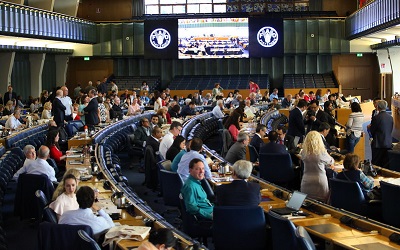
Global Symposium on Soil Fertility
International science-policy meeting to be held at FAO headquarters from 26-29 July.
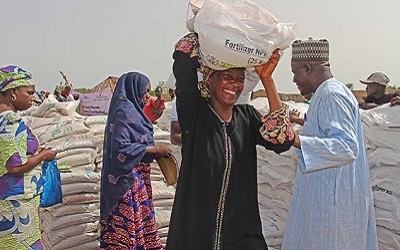
Webinar on the Fertilizers' Code implementation
Tools and practices explained in a virtual meeting with the experts.

Technical workshops on nutrition-sensitive agriculture
Sustainable soil management meetings planned for May 2021
Science and Innovation Forum
World Food Forum 2022 | Innovations in soil and plant nutrient management | 20 October 2022, FAO headquarters
Communication material
Where food begins
Healthy soils not only are the foundation for food, fuel, fibre and medical products, but they are also playing a key role in the carbon cycle, storing and filtering water, and improving resilience to floods and droughts.
Photo contest #Soils4Nutrition
Photo contest organized in the framework of the Global Symposium on Soils for Nutrition.
Available in: English
Soils and nutrients
Soils form, store, transform, and recycle the nutrients we all need to survive.
Download the English card here
Healthy soils grows 95% of our food
The planet survives only thanks to a few cm of healthy soil that grows 95% of our food.
Download the English card here
Soil fertility is...
Soil fertility is the ability to sustain plant growth by providing essential plant nutrients and favorable chemical, physical and biological characteristics.
Download the English card here
Healthy soils and the nutrient cycle
Healthy soils are the basis to produce sufficient, safe and nutritious food. When the natural nutrient cycle is not optimized, fertilizers need to be added to soils.
Download the English card here
Healthy soils and their supply of chemical elements
There are 92 naturally occurring chemical elements. Eighteen are essential to plants and 15 of them are supplied by soils.
Download the English card here
The challenge of nutrient balance
A judicious use and management of fertilizers is essential to soil health and food security.
Download the English card here
The Fertilizer Code
The Fertilizer Code addresses the judicious use and management of fertilizers to prevent their underuse, misuse and overuse.
Download the English card here
Six actions to prevent and reverse nutrient imbalances
Six actions to prevent and reverse nutrient imbalances: 1) Use fertilizers judiciously; 2) Promote nutrient measuring and mapping; 3) Enhance technical support to farmers; 4) Promote crop diversification and pulses; 5) Promote long-term sustainable soil management practices; and 6) Use adequately micronutrients.
Download the English card here
Bring back nutrients to soils
Soils are reservoir of valuable and renewable elements.
Download the English card here
Six actions for farmers to fight nutrient imbalance
Six actions for farmers to fight nutrient imbalance: 1) Assess nutrients need in plants and soils; 2) Maintain a balanced soil pH and include crop rotation; 3) Promote nutrient recycling; 4) Avoid soil compaction and reduce tillage; 5) Protect soil biodiversity and enhance extension services; 6) Control fertilizers quality.
Download the English card here
Soils and the SDGs
To what extent are soils related to the Sustainable Development Goals? Discover more.
Download the English card here
The 10th anniversary of the Global Soil Partnership
Celebrate with us the important achievements of the past decade of action!
Download the English card here

Soil, an essential ingredient to healthy food and nutrition
Our soils are by nature linked to the micronutrient content of our food production. The poster shows how to reverse the increasing trend of nutrient depleted soil by adopting sustainable soil management practices.



